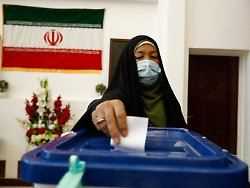Saturday 19th June 2021
Presidential election ended
Iranians voted
A change of power in Iran is considered almost certain. However, it is questionable whether the new man at the top can lead the country out of the severe economic crisis. The Iranians are more pessimistic. Correspondingly few people go to the polls too quickly.
The presidential election in Iran is over after 19 hours. A successor to President Hassan Ruhani was elected on Friday, who was no longer allowed to run after two terms in office. More than 59 million people were eligible to vote, but less than half of them wanted to vote. Because of the Corona crisis, the opening hours of the polling stations had been extended and their number increased to more than 70,000. According to the Ministry of the Interior, the first results are expected on Saturday or Sunday at the latest. The new president will then be sworn in in August.
According to the Iranian state television, voter turnout was high nationwide, including in the capital Tehran. According to eyewitnesses, however, there was a brisk turnout in some parts of southern Tehran, but otherwise the polling stations in the metropolis were relatively empty. According to surveys, around 40 percent wanted to vote, over 30 percent less than four years ago.
After the election, observers expect a change in political power. Of the seven candidates initially admitted, only four entered the race on election day. An ultra-conservative cleric, a reformer, a former general and a hardliner. The clear favorite is the cleric and head of justice Ebrahim Raeissi. The reform-minded economist Abdolnasser Hemmati, who is particularly hoping for a protest vote, is given the opportunity to be outsider.
In large parts of the population, Raeissi’s election victory is considered certain. Failed four years ago due to Ruhani, this time his path to the presidential office is much easier. This was also ensured by the so-called Guardian Council, which, as an electoral body, sorted out serious competitors. This even led to violent protests within their own ranks – and to great disinterest on the part of the people in an election that was widely perceived as being staged and undemocratic.
The way out of the crisis is via the USA
Experts are convinced that as President Raeissi would not continue Ruhani’s moderate course. During the election campaign, he focused more on economic issues and promised a quick end to the financial crisis caused by the US sanctions. But without negotiations with the USA on the future of the 2015 Vienna nuclear agreement, which has since been undermined by both sides, an end to the sanctions – and the almost three-year economic crisis – would not be feasible. It is precisely this agreement that Raeissi has sharply criticized in recent years. Now, however, his point of view sounds less radical. “We will respect the agreement, but we will set the conditions for it, not the US,” he said during the election campaign. He did not want to announce his conditions for this until later.
In Middle East politics, too, observers expect a more radical course when Raeissi takes over the presidency, and in relation to archenemy Israel an even more hostile one than before. There is more skepticism than hope among the population. Disappointed by Ruhani and the reformers, most Persians do not expect any major changes from Raeissi either. Above all, they hope for an end to the economic crisis. At the same time, many fear that Raeissi’s policies could lead to a renewed isolation of their country.
.
